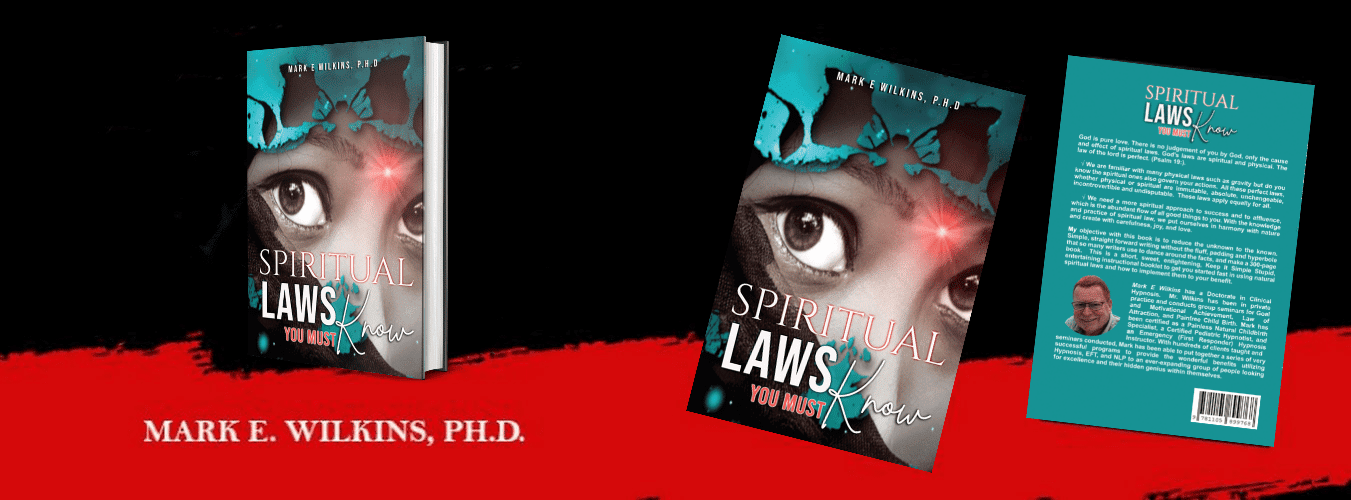
You grapple with the intersection of autonomy and destiny in your spiritual quest, deeply influenced by your personal choices and divine orchestration. 10 Key insights on free will. Each action seeds future outcomes, intertwined with karma, urging you to reflect deeply beyond immediate effects. Engaging with your intuition facilitates access to divine guidance, helping you transcend the illusion of control and align closer with your spiritual path. Embracing surrender doesn’t indicate weakness but a profound strength in acknowledging life’s unpredictability. Ethically, each decision carries a weight, shaping your spiritual and communal landscape, and teaching you the pivotal art of balancing moral integrity with personal growth. This exploration offers deeper insights into how your actions craft your spiritual narrative.
Key Takeaways
- Spiritual free will involves navigating the interplay between autonomy and divine alignment, facilitating personal growth and destiny.
- Choices carry karmic consequences, influencing future experiences and aligning with cosmic order.
- Intuition serves as divine guidance, helping to make decisions aligned with one’s spiritual path.
- Surrendering control allows for a deeper engagement with divine providence, enhancing spiritual freedom.
- Balancing personal decisions with destiny highlights the coexistence of free will and predestined pathways.
Defining Spiritual Free Will
In exploring the concept of spiritual free will, you confront the profound intersection of philosophy, theology, and personal belief. This journey compels you to ponder how spiritual independence and divine influence shape your existential choices. Spiritual independence implies a self-governed spirit, yet it’s juxtaposed with the notion that some aspects of life are influenced or even predetermined by divine forces. How do you navigate this intricate interplay?
The idea of personal responsibility within the domain of spiritual free will suggests that you hold the reins of your actions and their consequences. Yet, this belief doesn’t exist in isolation; it intersects with cosmic alignment—the idea that there are greater, perhaps celestial, patterns and designs at play. You’re tasked with discerning how much of your life’s direction is steered by your own choices versus cosmic forces.
This reflective analysis isn’t just philosophical but deeply personal. It challenges you to scrutinize the roots of your beliefs and the extent of your autonomy. Are you truly the architect of your fate, or are you co-creating your life narrative with unseen cosmic scripts? This introspection is essential as it shapes your understanding of freedom and destiny in the spiritual realm.
The Role of Destiny and Choice
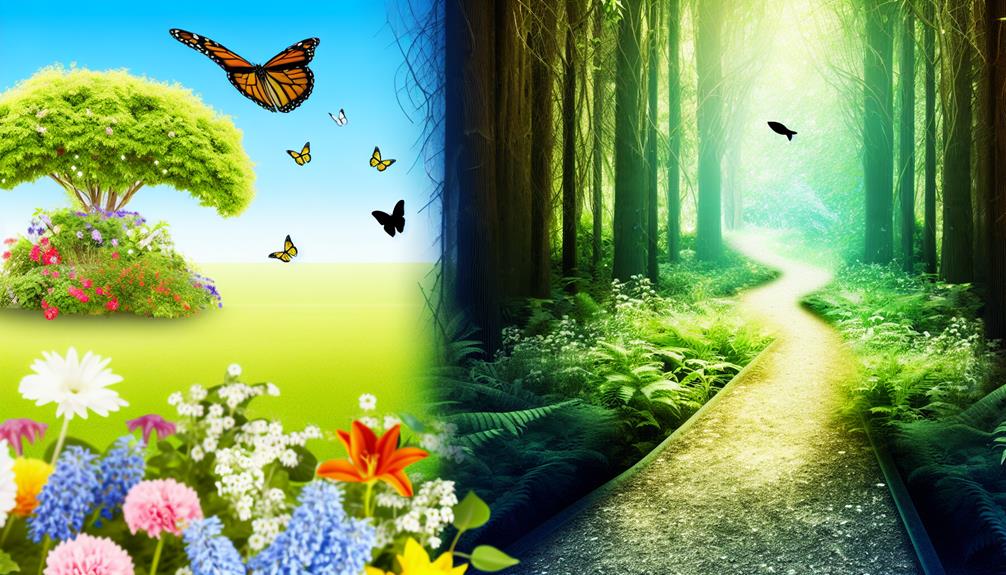
You might contemplate how destiny shapes your life’s trajectory and the extent you can assert control through personal choice.
This tension between predetermined paths and the power of decision-making invites a closer examination of spiritual doctrines and philosophical theories.
Reflecting on these elements, you’re encouraged to ponder whether your choices are merely reactions to destiny or genuine expressions of free will.
Destiny’s Influence Examined
Destiny often weaves its threads subtly through the fabric of our lives, posing the question of how much control we truly possess over our actions. As you explore the predestination debate, you’ll find it intertwined with notions of divine intervention, where every event might seem orchestrated by a higher power. This perspective suggests that your path is pre-determined, and spiritual guidance serves not to alter this path but to help you navigate it more consciously.
However, the contrast between fate and free will introduces a compelling counterargument. Here, destiny isn’t a script you’re bound to follow but a set of potentials, and your choices influence how these potentials unfold. This viewpoint empowers you, suggesting that while certain events are fated, your response to them is not.
It’s in this interplay that your spiritual journey finds its depth, challenging you to seek balance between accepting what’s destined and exercising your will to shape outcomes.
Reflecting on these concepts, it’s clear that the essence of your spiritual exploration lies not in seeking definitive answers but in understanding the dynamics between destined paths and personal choices. As you contemplate this, remember that your journey is as much about the questions you ask as the answers you find.
Power of Personal Choice
Many factors shape your life’s trajectory, yet personal choice stands as a fundamental force, guiding you through the maze of destiny’s possibilities. The extent of your control within this maze, sculpted by destiny’s broad strokes, hinges greatly on your capacity for inner reflection and self-awareness.
Engaging in deep self-exploration helps you understand not only who you’re but also how you can navigate the predetermined elements of your existence.
Self-awareness illuminates the options concealed within the folds of destiny, enabling you to make choices that resonate with your deepest values and aspirations. It’s through this awareness that you discern the potential impact of each decision, thereby amplifying your agency in shaping your path.
As you grow more attuned to your inner self, your decisions become more intentional, aligning more closely with your life’s purpose and desired outcomes.
The power of personal choice, thus, isn’t about steering your life in defiance of fate; rather, it’s about making informed decisions that harness the currents of destiny to your advantage. By cultivating a profound understanding of your own motives and desires, you become adept at navigating the complex interplay between choice and destiny, optimizing the trajectory of your life toward fulfillment and self-realization.
Karma and Decision-Making
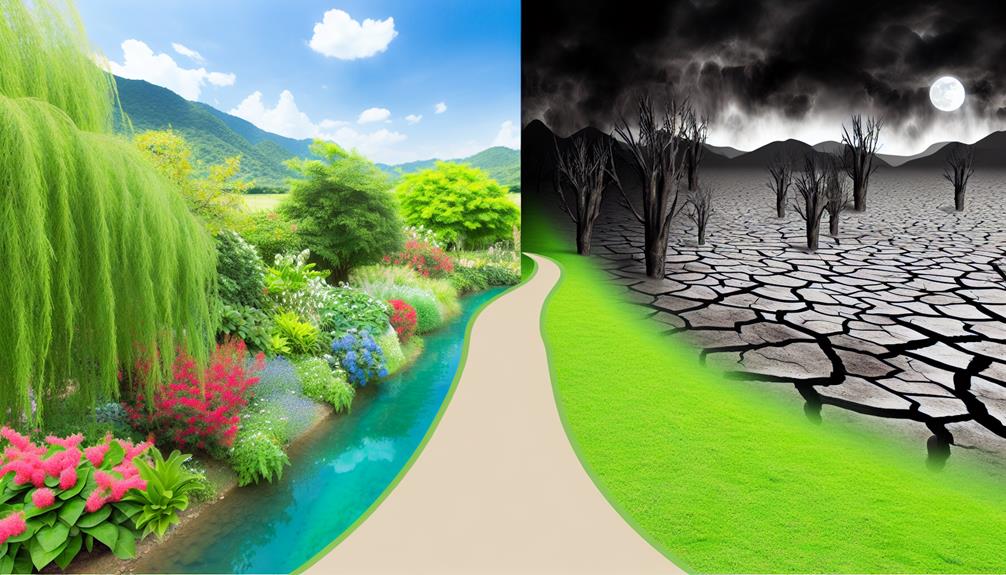
In examining the relationship between karma and decision-making, it’s crucial to recognize how each choice we make can ripple through our lives like waves on a pond. You’re not just selecting paths in a vacuum; each decision intertwines with karma’s impact, weaving your past, present, and future into a complex tapestry. The spiritual implications of your choices stretch far beyond the immediate outcomes, echoing in the universe’s moral balance.
When you act, you’re essentially planting seeds. Karma, a core principle in many spiritual traditions, suggests that these seeds grow into future experiences, shaped by the righteousness or harm of your actions. This reciprocal relationship highlights that you’re not merely subject to fate, but actively participating in shaping it. It’s a challenging yet empowering realization.
As you navigate life’s choices, consider how your actions align with your spiritual values and the broader cosmic order. Reflect on whether your decisions are contributing to harmony or discord, growth or regression. This reflective approach doesn’t just help in making ethically sound decisions but also in cultivating a life that’s attuned to a deeper spiritual resonance, ensuring that the ripples you create foster balance and enlightenment.
Intuition as Divine Guidance

Turning to intuition, you often tap into what can be seen as divine guidance, an inner compass that directs you beyond the domain of conscious reasoning. This intuitive guidance isn’t just random thoughts; it’s perceived as divine inspiration, a profound connection to the universe that guides your decisions. Here lies the essence of understanding how you, within your spiritual and existential framework, engage with the concept of free will.
To deepen your comprehension and enjoyment of how intuition can serve as divine guidance, consider these three aspects:
- Recognition: Learn to recognize when your intuition speaks distinctly from your rational mind. This recognition involves tuning into a quieter, more subtle inner voice that often doesn’t shout but whispers.
- Trust: Developing trust in your intuitive insights is essential. This trust doesn’t come overnight but grows as you acknowledge and act upon these insights, observing the outcomes and refining your understanding of where and how they lead you.
- Reflection: Reflect on the moments when your intuition guided you. What were the outcomes? Reflection helps you discern patterns and the nature of the guidance received, enhancing your relationship with this divine aspect of your being.
The Illusion of Control

While you explore intuition as a form of divine guidance, it’s equally important to examine the concept of the illusion of governance. This illusion, the belief that you can oversee every aspect of your life, often obscures the pathway to genuine freedom.
You might find yourself meticulously planning actions and outcomes, falsely assuming that sheer will can command the universe’s intricate tapestry. This mindset not only fosters frustration but also hinders the spiritual growth that arises from recognizing your limits.
The governance illusion can be seductive; it promises certainty in an uncertain world. Yet, the spiritual journey involves acknowledging that some events are beyond your personal command. Surrendering governance doesn’t imply weakness; rather, it signifies strength. It means embracing destiny, understanding that life’s unpredictable nature is a space where divine providence can manifest.
Releasing this false sense of governance allows you to operate in a domain where intuition and faith guide your decisions. Here, in this surrender, lies the cradle of true freedom—freedom from the constraints of needing to control everything. Embrace this liberating truth, and you’ll find that life flows more naturally, aligned with a greater, divine orchestration.
Ethical Implications of Choices
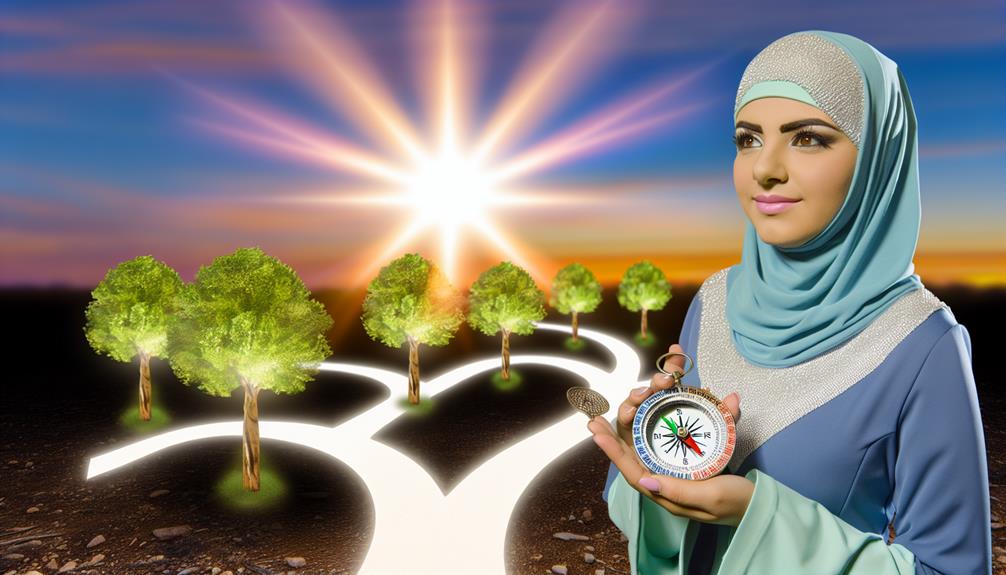
As you navigate through life’s decisions, it’s crucial to ponder the moral consequences of your choices. Each action you take holds a degree of accountability; understanding this can guide you in maintaining ethical integrity in challenging situations.
Reflecting on how dilemmas in ethical actions shape your spiritual journey can deepen your understanding of free will‘s role in personal growth.
Moral Consequences of Decisions
When you make a choice, you also shoulder its ethical consequences, illustrating the profound moral weight of free will. Every decision you take not only affects your path but often intertwines with the lives of others, weaving a complex tapestry of moral implications and ethical dilemmas.
Here are three key aspects to ponder when evaluating the moral consequences of your decisions:
- Impact on Others: Every choice has a ripple effect. Reflect on how your actions might influence the emotional, physical, and spiritual well-being of others. Are you enriching their lives, or could your decision potentially cause harm?
- Long-term versus Short-term: Often, decisions that seem advantageous in the short term may have adverse effects in the long run. Contemplate the sustainability of your choices and their enduring implications on your moral integrity and the welfare of others.
- Personal Values and Ethics: Align your decisions with your core values. This alignment is essential in maintaining a sense of ethical consistency and integrity. Ask yourself if your choices reflect who you aspire to be at your ethical best.
Accountability in Personal Choices
Why should you be held responsible for your personal choices? This question explores the core of personal accountability and the ethical implications of your actions. When you make a choice, especially a conscious decision, you initiate a series of consequences that reach beyond your immediate self.
This interconnection means your decisions impact others, shaping not just your destiny, but also influencing the community and broader environment.
Responsibility is vital because it highlights the importance of your choices in the grand tapestry of societal interactions. By accepting accountability for your actions, you recognize that you’re part of a larger whole, and your choices contribute to the well-being or detriment of this collective.
Conscious decision-making requires awareness of the potential outcomes and the moral significance of each choice. It invites you to reflect on not only the immediate benefits or drawbacks but also the long-term effects on yourself and others.
Therefore, embracing responsibility isn’t simply about facing consequences but about actively shaping the world through your decisions. It’s about acknowledging your role in the narrative of life and asserting control over the script you write through your actions.
Dilemmas in Ethical Actions
Exploring the landscape of ethical decision-making, you often encounter dilemmas that challenge the clarity of your moral compass. These ethical dilemmas compel you to weigh conflicting values and responsibilities, journeying through a complex interplay of choices that impact both yourself and others. Consider the profound implications these decisions have on your spiritual and moral growth.
To navigate these waters, here are three vital strategies:
- Reflect Deeply on Underlying Values: Before making any moral decisions, it’s essential to understand the fundamental values that are at stake. What principles are non-negotiable for you, and why? This reflection helps in prioritizing your actions in alignment with your deepest beliefs.
- Seek Diverse Perspectives: Ethical dilemmas often benefit from multiple viewpoints. Consulting with others can reveal aspects of the situation you haven’t considered, providing a fuller picture and helping to avoid biases that might cloud your judgment.
- Consider Long-term Consequences: When faced with tough choices, think beyond the immediate outcomes. How will your decision affect others in the long run? Anticipating future scenarios can guide you to make more thoughtful and sustainable decisions.
Learning Through Life’s Choices

Journeying through life’s myriad choices offers a profound opportunity to understand the essence of free will. Each decision you make serves not only as a reflection of your values and desires but also as a pivotal moment for self-discovery and growth. When you evaluate your options and select a path, you’re engaging in an act of creation, sculpting your future and the person you’re becoming. This process isn’t just about the external outcomes of your choices; it’s deeply entwined with your internal landscape.
As you navigate through these decisions, you’re invited into a space of inner reflection. Herein lies the chance for transformation. The choices you confront aren’t merely logistical or practical; they’re profound questions posed to your soul. How you respond can propel you toward new insights about who you’re and who you aspire to be. This continuous cycle of choice, reflection, and transformation forms the crux of your spiritual journey in understanding free will.
Each choice, then, isn’t just a simple selection but a cornerstone in the architecture of your spiritual identity. Engaging in this reflective practice, you not only shape your life’s path but also deepen your understanding of the freedom you hold to mold that path.
Synchronicity and Free Will
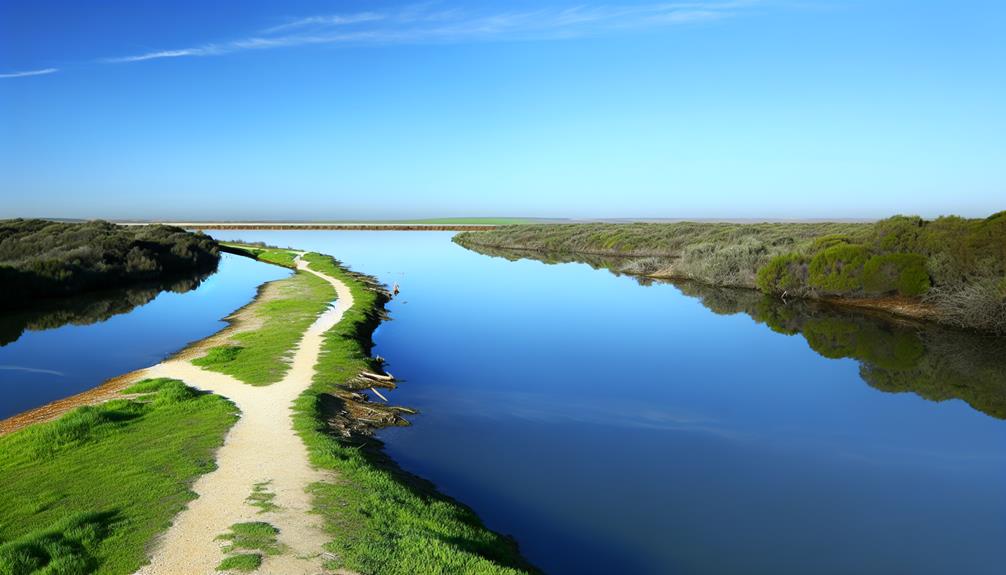
You might find it intriguing to ponder how synchronicity influences your perception of free will, particularly in the interplay between seemingly predestined events and personal choice.
By examining synchronicity’s role, you’re encouraged to contemplate whether life’s coincidences are random or part of a greater design.
Balancing these apparent destinies with your decisions can challenge and expand your understanding of autonomy and spiritual connectivity.
Understanding Synchronicity’s Role
While many view synchronicity as mere coincidence, its profound implications on free will suggest a deeper connection. You might find it fascinating how these seemingly random events can actually guide you towards personal growth and spiritual evolution. The concept of synchronicity isn’t just about random luck; it hints at the universe working in ways that align with your life’s path, nudging you toward decisions and realizations that foster your own development.
Here are three ways to interpret synchronicity’s role in your life:
- Divine Timing: Recognize that each event in your life isn’t just happenstance but is intricately arranged. Synchronicity can be a sign that you’re on the right path, with every timing and occurrence designed to push you towards broader horizons.
- Meaningful Coincidences: Start seeing these coincidences as messages or clues. They’re often aligned with your deepest struggles or questions and can provide insights that you mightn’t have considered.
- Spiritual Evolution: Each synchronous event invites you to a higher state of consciousness. They challenge you to expand your understanding and adjust your perspective in ways that align with your spiritual growth.
Reflect on these elements as you navigate your journey, and you might find that what appears as coincidence is often a guiding hand in your life.
Balancing Destiny With Choice
Synchronicity suggests not just a pathway illuminated by the universe but also poses significant questions about the interplay of destiny and free will in your life. This concept invites you to ponder the extent to which predetermined events shape your decisions and the paths you’re able to take. It’s not merely about fate vs. free will; it’s about understanding how these forces coexist and influence your journey.
As you explore deeper, you’ll find that finding balance between these seemingly opposing forces isn’t about choosing one over the other but rather learning to navigate their convergence. The moments of synchronicity – those instances where events align in a way that seems preordained – challenge you to contemplate whether you’re merely a puppet in a cosmic play or if you truly hold the reins to your destiny.
Reflect on how these moments have presented themselves in your life. Were they merely coincidences, or were they milestones of a mapped-out destiny that you’re meant to fulfill? By actively engaging with these experiences and analyzing their implications, you gain the opportunity to shape your future, one conscious decision at a time, while still embracing the mysterious elements of fate that weave through the tapestry of your existence.
Transcending Ego With Awareness
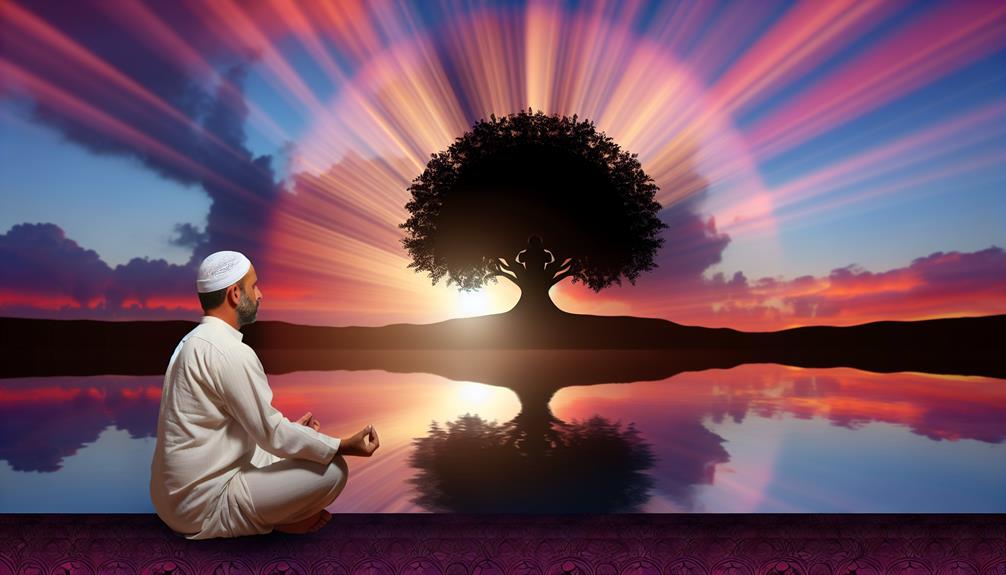
Delving into the depths of your consciousness can reveal how transcending the ego through awareness not only enhances spiritual enlightenment but also nurtures personal freedom. The journey towards ego dissolution is pivotal for spiritual growth, allowing you to experience a profound connection with the essence of your being. This process liberates you from the shackles of self-centered desires and fears, offering a clearer path to inner freedom.
Awareness cultivation is your tool for exploring this transformative journey. It involves a deliberate focus on the present moment and the patterns of your mind, helping you identify and gradually detach from the ego’s persuasive narratives. As you cultivate awareness, you foster a state of being that’s no longer at the mercy of fleeting emotions and thoughts.
Here are three ways to enhance your practice:
- Mindful Meditation: Regular meditation helps in observing your thoughts without attachment, training your mind to recognize the ego’s influence.
- Reflective Journaling: Writing down your thoughts and feelings can provide insights into how your ego shapes your perceptions and behaviors.
- Compassionate Engagement: Interacting with others from a place of compassion and empathy reduces ego-driven reactions and promotes genuine connections.
Aligning Choices With Higher Self
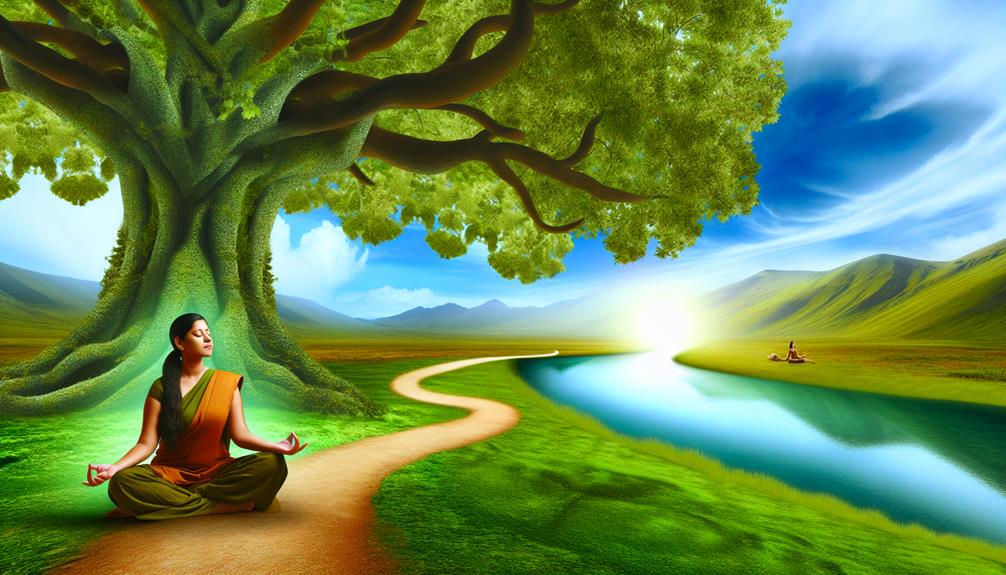
As you cultivate awareness and begin to detach from the ego, the natural next step is to align your choices with your higher self. This alignment isn’t merely a philosophical ideal but a practical pathway to living a more fulfilled life. To achieve this, you must deepen your higher self connection, which serves as an internal compass guiding your decisions. This connection ensures that your choices aren’t just reactions to external stimuli but are conscious choices reflecting your true values and aspirations.
Developing this profound connection requires consistent practice and introspection. It’s about listening to your inner guidance, which often speaks in a quiet voice, drowned out by the clamor of everyday life.
Spiritual alignment involves tuning into this voice, allowing it to guide your actions and decisions. It’s a process of learning to trust this internal guidance system over the louder, often misleading, influences of societal expectations and fleeting desires.
Frequently Asked Questions About Insights On Free Will
How Do Cultural Beliefs Influence Perceptions of Free Will?
Cultural beliefs greatly shape your perceptions of free will. They dictate societal norms that, in turn, influence individual choices, subtly guiding what you consider possible or acceptable. Your personal beliefs, interwoven with these cultural influences, either expand or limit your sense of autonomy.
Reflecting on these dynamics can reveal how deeply your actions and sense of freedom are rooted in the cultural context you’re immersed in.
Can Animals Experience Spiritual Free Will?
You might wonder if animals experience spiritual free will, considering the complexities of animal consciousness. It’s important to weigh ethical considerations when evaluating their capacity for spiritual autonomy. While they react instinctively, discerning whether they possess a form of free will that mirrors human spirituality demands deep reflection and study.
Ultimately, understanding their experiences fully requires acknowledging the limitations and potential biases in our current methodologies and perspectives.
What Scientific Studies Contradict Spiritual Views on Free Will?
Isn’t it fascinating how science challenges our deep-seated beliefs?
Scientific studies, particularly those examining neurological evidence, often contradict spiritual views on free will. Researchers have shown that many decisions may be processed in the brain before we’re consciously aware of them, sparking intense philosophical debates.
This suggests our sense of free will might be more about perception than actual autonomy, pushing you to reflect on the true nature of your decisions.
How Do Mental Health Issues Affect One’s Free Will?
Mental health issues can greatly impact your free will, often clouded by symptoms or the stigma surrounding your condition. This stigma might restrict your ability to make autonomous choices, fearing judgment or misunderstanding. However, exploring therapy options can help regain a sense of control and decision-making power. Reflect on these influences critically, and consider how engaging with different therapeutic approaches might enhance your ability to exercise free will amidst mental health challenges.
Do Children Perceive Free Will Differently Than Adults?
As you navigate the winding path of understanding, consider how children’s perception of free will evolves distinctly from adults. In their developmental stages, cognitive growth deeply influences decision-making abilities. Children, still in the throes of cognitive development, experience free will through a lens less clouded by societal norms, leading to a purer, albeit less informed, understanding of choice. Their evolving minds shape how they interact with the concept of free will uniquely.
Conclusion
As you navigate the labyrinth of life, remember that each junction offers a choice. Like a river, your decisions carve through the bedrock of destiny, shaping futures yet unseen. The stars may guide your voyage, but it’s your hand on the tiller that steers the course. Integrate the wisdom of your higher self and let intuition illuminate your path. In this dance of destiny and free will, realize that the ultimate freedom lies in conscious, reflective choice.
In the realm of spirituality, the concept of free will is governed by the Spiritual Law of Free Will. This law grants individuals the power to make choices that shape their own destinies. Children, still in the throes of cognitive development, experience free will through a lens less clouded by societal norms, leading to a purer, albeit less informed, understanding of choice.
Their evolving minds shape how they interact with the concept of free will uniquely. As you navigate the labyrinth of life, remember that each junction offers a choice. Like a river, your decisions carve through the bedrock of destiny, shaping futures yet unseen. The stars may guide your voyage, but it’s your hand on the tiller that steers the course. Integrate the wisdom of your higher self and let intuition illuminate your path. In this dance of destiny and free will, realize that the ultimate freedom lies in conscious, reflective choice.
Take The Next Step
Mark’s latest book “Spiritual Laws You Must Know” is available on LuLu and on Amazon. Be sure to purchase two copies and give one to a friend, you do reap what you sow!

